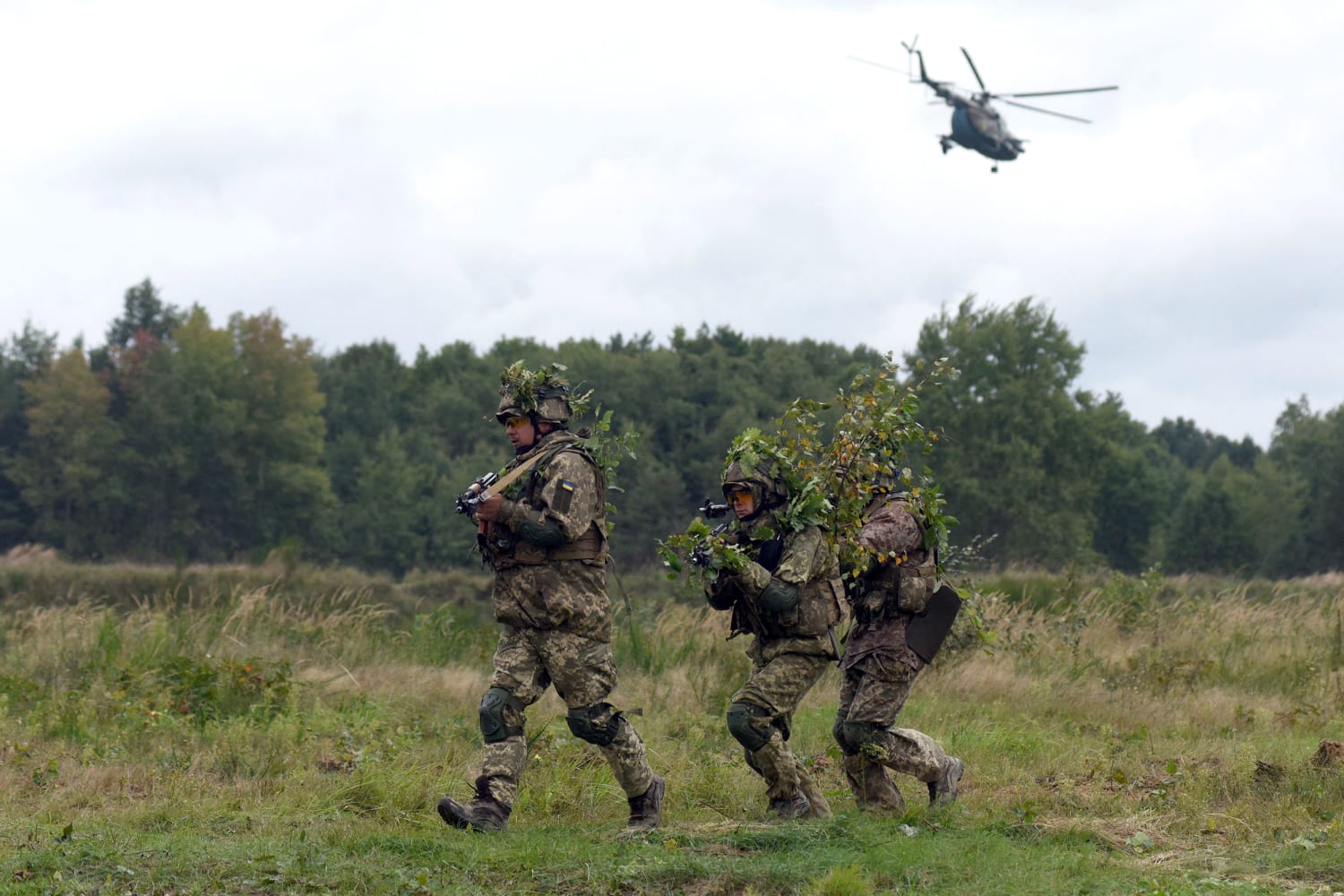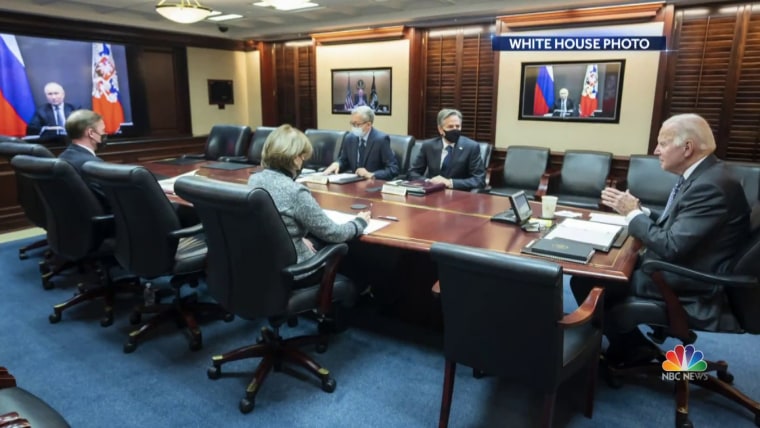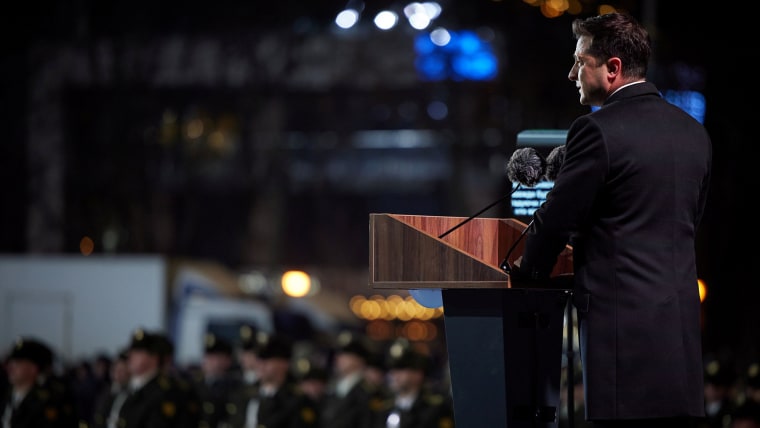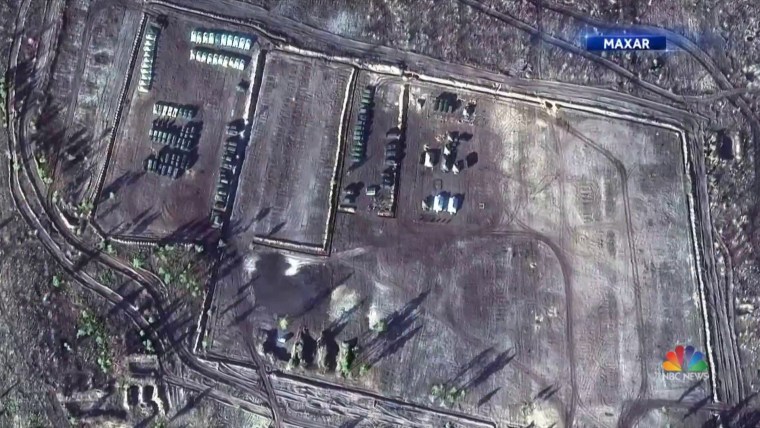The Biden administration is weighing sweeping sanctions against Russia if it invades Ukraine that could cripple Russia’s access to bond markets, throttle major commercial banks and target powerful oligarchs, an approach that will put Washington in uncharted waters in its confrontation with Moscow, current and former administration officials said Wednesday.
President Joe Biden is betting the threat of unprecedented sanctions will persuade Russian President Vladimir Putin to pull back from the brink, but it’s not clear how far the White House will be willing to go to punish Moscow, and whether it will be enough to change Russia’s calculus.
With Biden facing a new test as commander-in-chief just months after a chaotic withdrawal from Afghanistan, White House officials said the mood is “focused” as they consult with NATO allies and provide regular updates to the president. The crisis has steadily intensified over the past two months as Russia has built up a formidable military presence on Ukraine’s border, with more than 90,000 combat troops on the ground.
Biden said Wednesday a unilateral U.S. military response was “not in the cards” if Russia attacked Ukraine, making it clear economic pressure remains the primary tool left for Washington and its European allies. U.S. sanctions previously imposed on Russia have been relatively constrained compared to hard-hitting measures that have been slapped on Iran or Venezuela, smaller economies with fewer ties to global markets. But this time, the Biden administration says the gloves will be off.
Biden told reporters on Wednesday that he told Putin that “there will be severe consequences” if Russia moves on Ukraine, “economic consequences like none he has ever seen.”
The possible measures to which Biden was alluding, say current and former officials, include blocking Russia’s access to bond markets in New York; sanctioning major Russian commercial banks, possibly including the massive VTB bank, which is majority-owned by the Russian government; undercutting Russia’s ability to convert rubles into dollars or other foreign currencies; targeting oligarchs linked to Putin with financial and travel restrictions; and even cutting off Moscow’s access to the SWIFT international bank messaging system.
Knocking Russia off the SWIFT system would be a drastic step that could also have damaging consequences for European and U.S. businesses, former officials say.
As Biden officials calibrate their response, they are considering both worst-case scenarios but also the possibility that Putin has already achieved what he set out for: disruption for disruption’s sake.
A keen observer of his counterparts’ domestic politics, Putin’s provocative actions come as Germany sees its first transition of power in 16 years with the end of Angela Merkel’s chancellorship, while French President Emanuel Macron gears up his own reelection campaign, and as Biden himself faces political headwinds at home.
In Congress, lawmakers from both sides of the aisle expressed outrage at Russia’s troop buildup and endorsed the administration’s threat to introduce broad and punishing financial sanctions.
“This isn’t your run-of-the-mill sanctions,” said Sen. James Risch of Idaho, the ranking Republican on the Senate Foreign Relations Committee. “This is going to be a big deal if they make that invasion, and it’s going to involve sovereign debt, it’s going to involve the SWIFT banking system, it’s going to involve the international banking system.”
Biden has come under sharp criticism for suspending sanctions earlier this year on Russia’s Nord Stream 2 natural gas pipeline under the Baltic Sea, a project strongly opposed by Ukraine and other Eastern European countries. But U.S. officials say the administration will not hesitate to impose sanctions and prevent the completion of the pipeline if necessary.
If Russia launches an offensive, “our expectation is that the pipeline will be suspended,” Victoria Nuland, undersecretary of state for political affairs, told a Senate hearing on Tuesday.
Senior state department officials traveling with Secretary of State Antony Blinken at a NATO meeting in Latvia last week said Germany and other European countries were in lockstep with Washington on holding up final approval for the pipeline, even if it caused economic pain for the continent, which relies heavily on Russian gas supplies.
Sanctions against Russia’s broader energy industry would be unlikely, because the move could boomerang and trigger even higher gas prices in Europe and the United States, former officials said.
Given Russia’s myriad links to the global economy, tough sanctions will inevitably have knock-on effects on multinational corporations, stock markets and European economies in particular. But U.S. officials said they are determined to send a message of resolve to Moscow, and that Biden made it clear in his two-hour video call with Putin that the U.S. would not abide by Russian aggression.
According to two White House officials, the president told Putin, “One nation can’t force another nation to change its border; one nation cannot tell another to change its politics; and nations can’t tell others who they can work with.”
Previous attempts at sanctions have had a limited effect on Russia’s actions, and experts disagree about to what degree the threat of sanctions shapes Putin’s decision making.
Sanctions imposed after Russia seized Ukraine’s Crimean Peninsula in 2014 did not succeed in pushing Moscow to retreat, though an array of measures over the past decade have held back Russian economic growth by several percentage points, according to Brian O’Toole of the Atlantic Council think tank, who worked on sanctions policy at the Treasury Department during the Obama administration.
The prospect of tougher sanctions, however, helped convince Putin to agree to a ceasefire in eastern Ukraine and enter into negotiations, O’Toole said.
Apart from sanctions, the Biden administration is looking at providing more weapons and military assistance to Ukraine and trying to revive a stalled peace process for the conflict in eastern Ukraine, which pits Russian-backed separatists against the Ukrainian government.
Some members of Congress have appealed to the White House to move faster to deliver military aid to Ukraine, two lawmakers told NBC News, and a bipartisan congressional delegation is due to travel to the country this week.
The delegation is expected to confer with Ukrainian officials as well as U.S. military officers overseeing training for Ukrainian troops. The Florida National Guard’s 53rd Infantry Brigade Combat Team deployed a week ago to take over training efforts, which date back to 2015. A U.S. special operations contingent also oversees training and exercises with Ukrainian forces.
The American troops are barred from taking part in any combat.
Current and former officials also said the administration was exploring how to breathe life into the “Minsk” peace process mediated by France and Germany since Russia’s invasion in 2014. One option under consideration would have the U.S. join the peace talks.
Former U.S. ambassador to Russia Michael McFaul last week made the case for the U.S. to get more involved in the peace process, arguing it would help counter Russian propaganda that Ukraine is gunning for a war and to head off an attempt by Moscow to shut out Ukraine from any diplomatic settlement.
But any diplomatic effort is currently hampered by the lack of a U.S. ambassador in Kyiv. The Biden administration has yet to submit a nominee for the post.
As the White House prepared for more discussions with NATO allies and the Ukrainian government, it remained unclear what Russia had planned. There was no sign of an imminent invasion, despite the massing of troops, a U.S. intelligence official said.
CIA Director William Burns, who once served as an ambassador to Russia, said at a Wall Street Journal event Monday that “we don’t know that Putin has made up his mind to use force.”
He added: “But what we do know is that he’s putting the Russian military and the Russian security services in a place where they could act in a pretty sweeping way.“
Source: | This article originally belongs to Nbcnews.com













